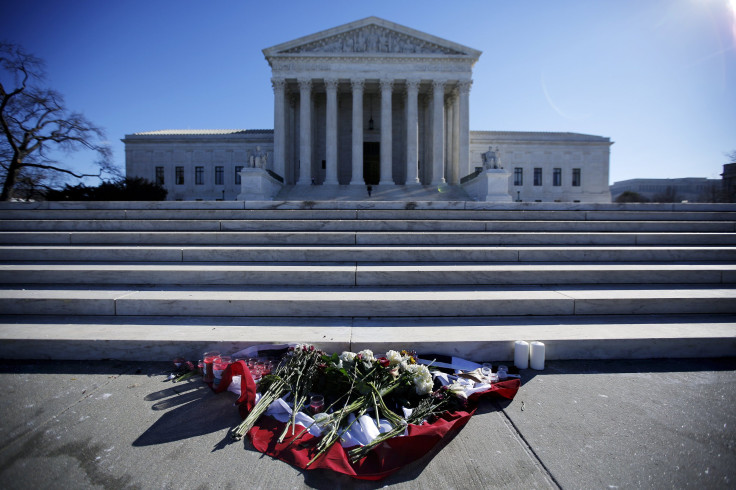Justice Scalia's Replacement: With Voting Rights And Affirmative Action At Stake, Black Activists Urge Swift Confirmation

For the African-American community, there is potentially a lot riding on President Barack Obama’s decision on who fills the seat of U.S. Supreme Court Justice Antonin Scalia, who died suddenly Saturday. Such a choice is seen as one of the president’s last opportunities to cement his legacy as the first black commander-in-chief amid constant obstruction from his opponents in Congress.
It’s unclear how quickly Obama will put forth a name and how soon the U.S. Senate would move to confirm the nominee. But that process could happen as the high court hears and rules on cases that impact affirmative action in college admissions and equitable political representation in minority and immigrant communities, among others.
Within hours of the announcement of Scalia’s death, some Republican leaders in Congress and GOP presidential candidates called on Senate members to delay the confirmation process until after the 2016 general election. Noting the president’s and the Senate’s constitutional duty to fill the vacancy, several black leaders over the weekend blasted those trying deny the president a final Supreme Court appointment and jeopardize crucial cases before the court.
The NAACP, the nation’s largest and oldest civil rights organization, said Sunday it was ready to help Obama and the Senate move quickly on filling the vacancy. Cornell William Brooks, the NAACP president, also offered the organization’s condolences to Scalia’s family.
“We honor the service of all those who have served on the court by continuing its work unimpeded and realizing the constitutional values of the nation and NAACP,” Brooks said in a statement.
Wade Henderson, president and CEO of the Leadership Conference on Civil and Human Rights in Washington, D.C., echoed Brooks’ sentiments. “The Constitution that Justice Scalia revered provides a mechanism for filling judicial vacancies, and our elected officials must take that responsibility seriously,” Henderson said in a statement released Saturday. “The work of the United States Supreme Court is too important to the nation to allow a vacancy to go unfilled for an extended period of time,” he added.
We must support the President is his ability to do his job. We must vigorously resist any effort to block his doing so in a timely manner.
— Reverend Al Sharpton (@TheRevAl) February 14, 2016
During his first term in office, Obama successfully nominated two women to the court -- Justices Elena Kagan and Sonia Sotomayor, who became the first Latina to serve on the court. Some within the black community saw Scalia’s death as an opportunity for Obama to make history again, perhaps by nominating the nation’s first African-American female justice.
It was Senate Majority Leader Mitch McConnell’s suggestion Saturday that Republicans members oppose anyone Obama nominated that elicited terse responses from black leaders in Congress. Meanwhile, during Saturday night’s Republican presidential debate in South Carolina, Donald Trump was among a few candidates encouraging Senate members to “delay, delay, delay” the confirmation process.
With only eight justices on the court, instead of nine, some black leaders were worried that a vacancy would imperil consideration of two Texas-based cases. The “one person, one vote” case, which asks justices to decide whether total population or the number of eligible voters in a community should be used in drawing state legislative districts, could shift political representation toward whiter, rural communities and away from urban areas with high concentrations of noncitizen residents and felons disenfranchised by the criminal justice system. There is also the court’s second challenge to affirmative action, or the weighing of an applicant’s race in college admissions.
The Congressional Black Caucus said McConnell was “reinforcing the Republican political agenda to disrupt governmental functions when the circumstances do not line up with their philosophy.” Most recently, Republicans held up for weeks the confirmation of Attorney General Loretta Lynch, the first black woman in the post, over an unrelated policy disagreement.
Caucus chairman G.K. Butterfield called it “absurd” that Obama should be denied a court pick. “The American people should clearly understand that Senate Republicans have a political agenda to pack the Court with conservative justices who would reverse years of progressive jurisprudence,” Butterfield said in a statement released Saturday.
He added: “We will vigorously confront Senate Republicans at every turn should they dismiss President Obama’s nomination.”
© Copyright IBTimes 2024. All rights reserved.






















